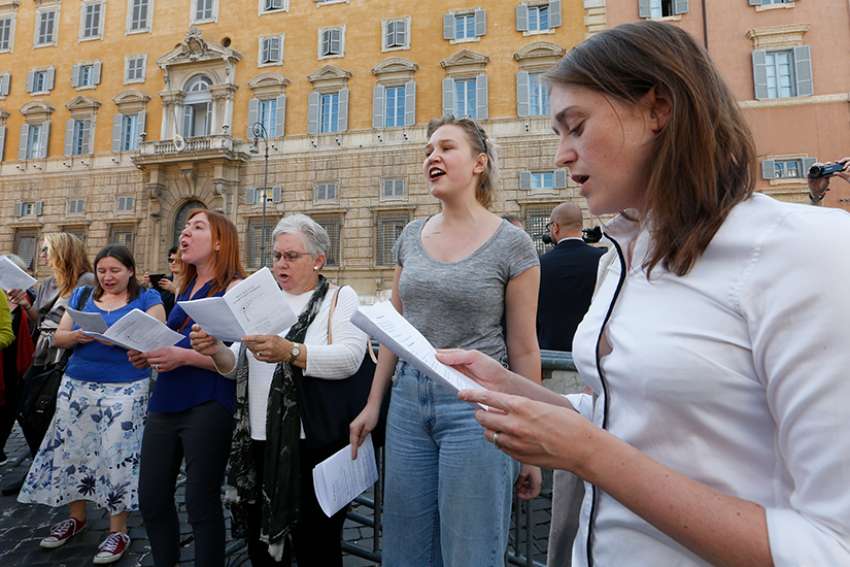Protesters chant outside the Congregation for the Doctrine of the Faith before the opening session of the Synod of Bishops on young people, the faith and vocational discernment at the Vatican Oct 3. Protesters demanded that women be given the right to vote at the synod.
CNS photo/Paul Haring
Superiors general believe women should have voting power at synod
By Catholic News Service
VATICAN – Although bishops should make up the majority of voting members at a Synod of Bishops, the fact that the body is only consultative means women should be included as full members just as priests and religious brothers are, said three priests who are voting members.
The superiors general of the Dominicans, the Jesuits and the Conventual Franciscans -- all priests who are voting members of the synod -- spoke to reporters at a Vatican briefing Oct. 15.
When the men's Union of Superiors General chose two religious brothers to be among their 10 voting delegates at the Synod of Bishops, they consciously made the choice to emphasize that men's religious orders include both priests and laymen, the minister general of the Conventual Franciscans said.
"Obviously it wasn't an accident" that two brothers were elected, Father Marco Tasca, the minister general, told Catholic News Service after the briefing. "Consecrated life is made up of priests and laypeople, so it is only right that there also be lay superiors general at the synod."
When the superiors elected a brother to the 2015 synod, he said, "there were some doubts about whether or not the synod office would accept him, but the pope intervened and said, 'Let him come.' Case closed.
"This time we didn't ask," Father Tasca said.
Now, he said, that choice "should raise the question of the presence of the sisters, the women. That is the great challenge."
The men's USG and the women's International Union of Superiors General are now asking that question together, Father Tasca said. "We had a meeting last week -- a small group of superiors from both -- and we asked, 'How can we move on this together?'"
The two organizations of superiors, which hold a joint meeting each November, will get together again, he said, to try to move the question forward. "I think the correct path is to present this together, not 'we men' or 'we women' like children, but together."
While rules for the Synod of Bishops provide for the men's union of superiors to elect 10 voting members for the synod, there is no such provision for the women's union of superiors. However, the pope does appoint women religious as observers or experts to the synods.
Several questions at the synod briefing Oct. 15 regarded the presence of women and their lack of a vote.
"It's a Synod of Bishops," said Father Bruno Cadore, master of the Dominican order. But, he said, the synod rules allow for "representatives" of religious life to participate, and they should be both men and women. "You know," he said, "that 80 percent of consecrated people in the church are women?"
Because the synod "is not a deliberative body, so it is not tied to priestly ordination, I think in the future there will be a Synod of Bishops that says, 'We want the participation of those who collaborate with us in pastoral work and, for this reason, we will invite representatives of consecrated life,' knowing that -- as I said -- 80 percent of them are women. This should happen."
In fact, he said, with this synod focused on "young people, the faith and vocational discernment," it would have made sense to have more women religious participating, given their work in the field of education, faith formation and vocational promotion.
Father Arturo Sosa, superior general of the Jesuits, said he agreed with Father Cadore that "it is a Synod of Bishops," but he also said he sees an effort by Pope Francis to "deepen the synodality of the church" and strengthen the vision of the church as "the people of God" by ensuring that men and women are treated equally and have an equal voice.
"I think this will help us move forward," Father Sosa said.
The repeated questions about women's participation and an international petition calling on the pope to give women a vote at the synod signify "discomfort, which is a sign that something's wrong," he said. "So one must listen and move forward."
Tagged under:
Please support The Catholic Register
Unlike many media companies, The Catholic Register has never charged readers for access to the news and information on our website. We want to keep our award-winning journalism as widely available as possible. But we need your help.
For more than 125 years, The Register has been a trusted source of faith-based journalism. By making even a small donation you help ensure our future as an important voice in the Catholic Church. If you support the mission of Catholic journalism, please donate today. Thank you.
DONATE

